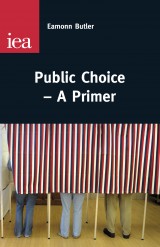It’s common for politicians and officials to discuss “market failure” before setting out how the government will correct those failures. However, government fails too and with widespread, profound consequences for us all. Why?
 Dr Eamonn Butler’s Public Choice – A Primer explains how Public Choice Theory applies the methods of economics to the theory and practice of politics and government to provide important insights into the nature of democratic decision-making.
Dr Eamonn Butler’s Public Choice – A Primer explains how Public Choice Theory applies the methods of economics to the theory and practice of politics and government to provide important insights into the nature of democratic decision-making.
Just as self-interest motivates people’s private commercial choices, it also affects their communal decisions. People also ‘economise’ as voters, lobby groups, politicians and officials, aiming to maximise the outcome they personally desire, for minimum effort.
That includes capturing the state for commercial advantage, ostensibly in the public interest.
In my first two years in Parliament, I have seen most of the issues described in action. Armies of lobbyists are employed by rent-seeking interest groups. Chairmen steer agendas to achieve desired results, particularly in the case of the executive’s control of Parliamentary business. Voting does not reveal how voters truly feel about the issues at stake. There’s gaming, free-riding, logrolling (supporting each other’s proposals), rational ignorance and, notably, time-shifting: enjoying benefits today to be paid for by future taxpayers. Officials seek to increase their budgets and power while politicians struggle to restrain them.
The conclusion which comes from a robust understanding of society and of government as an institution full of real people with all their own failings is simple. Politicians and officials should be restrained from interfering in the lives of the people. Government should stick to those few things it is good at and politicians should be much more humble and realistic about what they can achieve.
I thoroughly recommend Eamonn’s excellent primer, which is available free to download or to buy here.